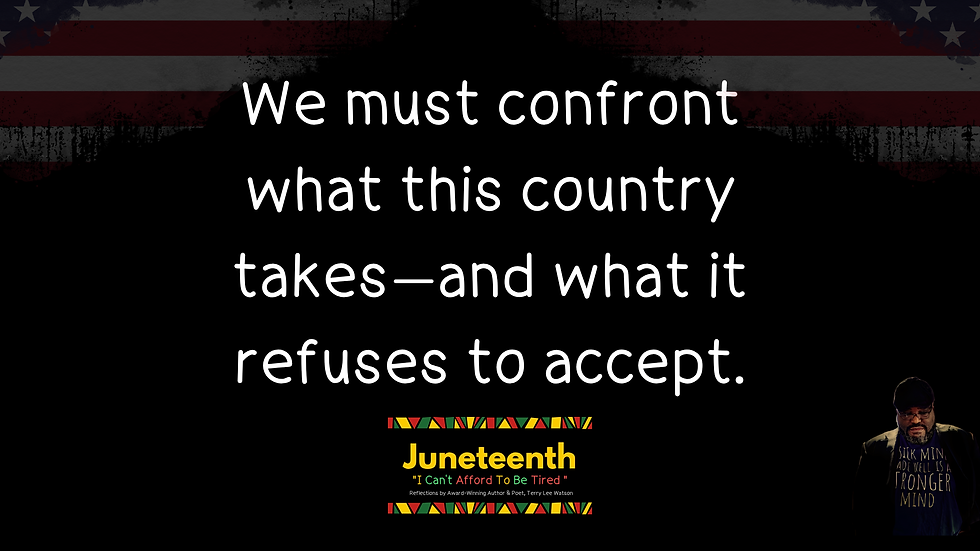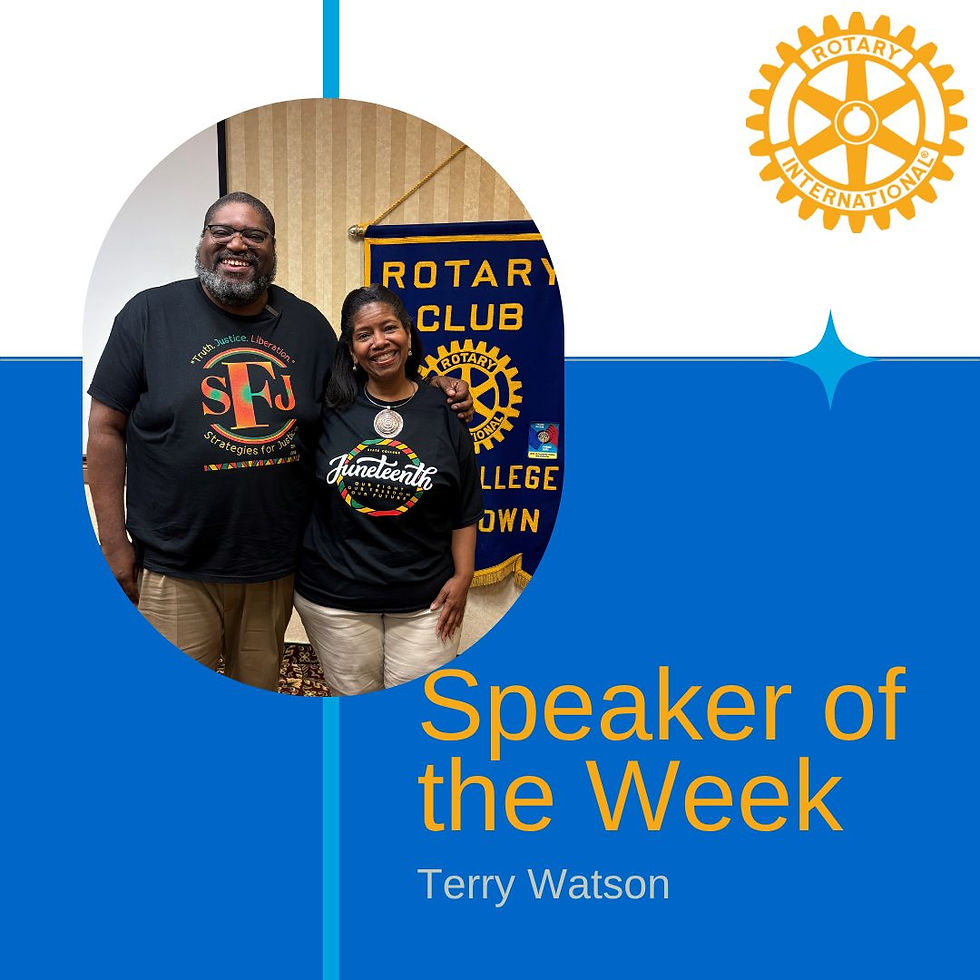Understanding the Significance of Juneteenth and Its Call to Action
- SFJ
- Jun 22, 2025
- 7 min read

Juneteenth: “I Can’t Afford to be Tired”
Description:
On June 19, 2025, Terry Lee Watson was invited by the State College/Downtown Rotary Club to give remarks on what Juneteenth means in 2025. This occurred at noon at the Ramada Inn, State College, PA.
Synopsis:
Presented by award-winning author and poet Terry Lee Watson, I Can’t Afford to Be Tired is a thought-provoking Juneteenth reflection on the emotional cost of truth-telling, the endurance of Black liberation, and the burden of generational perseverance. Drawing from his award-winning book Welcome to the Sick Mind of a Sane Person: Deconstructing Racism and White Supremacy, Watson confronts the uncomfortable truths of injustice—not with despair, but with clarity, urgency, and renewed purpose.
Speech: Juneteenth: “I Can’t Afford to be Tired”
Good afternoon, members of the Rotary Club. It’s an honor to stand before you today on this day of reflection, remembrance, and liberation.
For those who don’t know me, I’m Terry Lee Watson: author, speaker, and poet. But more than that—I’m a husband, a father, and a deeply engaged member of this community we share. Today, I want to share with you all a reflection of Juneteenth and what it means in 2025.
In preparing for today, three reflections kept circling in my mind.

First: The delay of freedom sustains the reality of injustice.
How many of you learned about Juneteenth during your K–12 experience?
How many of you learned about Independence Day during your K–12 experience?
I didn’t learn about Juneteenth until college. Not once in K–12 did I hear about the day when over 250,000 enslaved Black Americans in Texas finally learned they were free—two and a half years after the Emancipation Proclamation. Imagine that. Imagine what it means for a free country to withhold freedom. The delay in my education mirrored the delay in liberation—and it’s with this that my first reflection derives. The delay of freedom sustains the reality of injustice. In 2025, we are at it again. It seems like every generation has its moment in which freedoms are tested and the reality of injustice is unveiled.
As we sit here today, someone’s right to breathable clean air or to have access to drinkable water is being tested. Someone doesn’t have full rights over their body, someone doesn’t have the right to pray to the God of their choice, or the ability to access adequate healthcare or affordable housing. I can spend the rest of my time identifying freedoms denied, and most will think I am talking about foreign lands, but no, I am talking about right here in America, PA, Centre County. So in 2025, Juneteenth is not just about what was withheld. It’s about what could no longer be denied.

Second: We must confront what this country takes—and what it refuses to accept.
Over the last few years, I’ve spoken across the country about truth, justice, and liberation. I’ve learned that there are two kinds of people: those who lean into uncomfortable truths and those who turn away. In 1852, an influential speech was delivered that profoundly changed my outlook on this country. In June of that year, the great abolitionist Frederick Douglass was invited by the Rochester Ladies' Anti-Slavery Society to address the topic of Independence Day. I’m reminded of Frederick Douglass’s powerful question: “What, to the slave, is the Fourth of July?” He didn’t mince words. He didn’t smooth over the contradictions of a nation that celebrated independence while still holding human beings in bondage. But even as he told hard truths, he held onto hope. That balance—honesty without despair—is a lesson we still need.
This sparks my second thought of today: We must confront what this country takes—and what it refuses to accept.
Waking up each day in a nation that craves your brilliance yet dismisses your burdens, that embraces your culture but overlooks your history, and values your resilience while ignoring your rage—this is the reality that I speak of.
I call this a translucent reality—where freedom is promised but not always practiced, progress is proclaimed but not always protected, and some celebrate liberation yet silence our calls for justice. It's like looking through a fogged-up window—you see the shape of freedom but not its full form. And too often, people are content with that blurry vision of freedom.
And third: I can’t afford to be tired—and neither can you.

This year has tested all of us. I’ve had students ask me, “What does the rollback of DEI mean for people like me?” I’ve sat with their fear, and their fire. I’ve witnessed our community rally after rumors of ICE sightings in State College, standing together in strength. And I’ve heard from the elders—from across the country and this community—who told me they’re not done fighting. Who looked me in the eye, called me up, and asked, “What can I do?” and “What are you willing to do?”
Then I thought about Opal Lee, the “grandmother of the movement,” a 89-year-old who walked from Texas to the National Capitol to see Juneteenth made a national holiday.
The questions and actions of our elders remind me of my own declaration, which I wrote as my friend Leslie Laing and I prepared to celebrate Juneteenth in State College the summer of 2020.
“I can’t afford to be tired.”
It is 2:00 a.m., and I’m adding the finishing touches to a Juneteenth event I am preparing for. My friend Leslie Laing and I review the last part of our script at that hour all because it has been a long year (2020) and we wanted to make sure our community recognized the importance of this liberation celebration. After I am done and we log off, I decided to write this poem appropriately titled I Can’t Afford to Be Tired.
I am the capturer of narratives and the teller of the stories. Therefore, I strive to be a beacon of truth. One of the most approachable questions I get consistently is,“Where do you find the time?” I am constantly and consistently seeking liberation for all. But I am not alone in this quest, nor is this quest original. Therefore, I call this moment, “I can’t afford to be tired.”
I can’t afford to be tired. Me? No, not I.
Who am I to say I am tired? When I know the struggle is at its beginning. When I know my current being is due to the sacrifices my father made to reject the ideology of tiredness himself.
I can’t afford to be tired. Me? No, not I.
What is afforded to me, a tired body? With the knowledge of my ancestor’s will. I feel like it is an insult to their memory if I announce tiredness as my weak point, never allowing this wound to heal.
What is tiredness to me but another emotionstored and embodied in the perseverance of my fighter’s cause. Tiredness is not in the marchbut in the mind that continues to ponder.
I can’t afford to be tired. No, I can’t. This God has not given to me. A gift or curse of hope, a gift or curse it’ll be.
I can’t afford this notion, never. I now have a generation to consider,bitter, might that taste be, I cannot wilt or wither.
If ever allowed my eyes to close, what thoughts will be allowed to run? If ever allowed to rest at will,no, not until my last breath is done.
I can’t afford to be tired. No, I can’t.
Injustice I learn takes no breaks,so therefore neither do I.
I may weep your painbut never allowing my soul to cry.
Help!It is not a word reserved for all,Help!It is not the world that I loathe or adore.
I can’t afford to be tired. Me? No, not I.
Oppression sees my tiredness as a weak point; I see it as the peak of my endurance will.
Energized by my ancestral wisdom,water, earth, fire, wind, be still.
Kill these thoughts of inferiority.
Kill these notions of inequity.
My being produces only a notion of justice
Freedom is all I will accept as a part of this so-called democracy.
Oh, I can’t afford to be tired. Me? No, not I.I feel the pressure come on in the sense of my firstborn son.So know this fire burning is not at its end. No, my people, this fire has just begun.
I wrote that declaration as both a confession and a commitment, and today, I invite you to share it with me--because Juneteenth is not just a history lesson or a celebration—it’s a reminder that delayed freedom is not freedom at all, that progress without participation is fiction, and that hope—real hope—is not and will never be passive.
It’s a choice. It’s work. It’s showing up, again and again, never letting tiredness be your weak point, but instead as the peak of your endurance will.
So, I leave you with this:
This Juneteenth, we are reminded of this translucent version of freedom. We can not, nor should we ignore delays in freedom, nor the burden that one takes when they fight for freedom.
But you who are here today remember,
We are not powerless.
We are not voiceless.
And most notably, we are not done.
Thank you—and let’s keep moving forward, together.
Terry Lee Watson
Speech for the Rotary Club
19 June 2025
Juneteenth: “I Can’t Afford to be Tired”


Terry Watson is a professional speaker, author, and trainer who specializes in disability equity in education, racial justice, and law enforcement. He has more than 20 years of experience working in higher education. He is the founder of Strategies for Justice, the host of Moses' People Speak, and the author of the award-winning book Welcome to the Sick Mind of a Sane Person: Deconstructing Racism and White Supremacy.











Comments